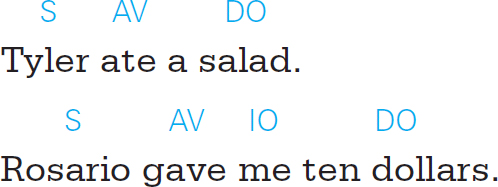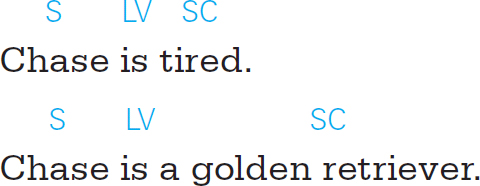5 | Sentence Structures
5|Sentence Structures
Sentences contain familiar patterns of syntax, or word order, that allow us to make sense of them. The main elements of a sentence include subject, verb, object, and complement.
The subject (S) identifies some person, place, object, situation, or idea.
The verb (V) may be an action verb or a linking verb. Action verbs (AV) express action; linking verbs (LV) express a state of being. Helping verbs (HV) accompany the main verb to indicate tense. The verb plus its surrounding objects, complements, and other modifiers is referred to as the predicate.
An object may be either direct or indirect. A direct object (DO) is the target of the verb’s action; an indirect object (IO) is the recipient of the verb’s action.
A complement renames or describes a noun. Subject complements (SC) rename or describe the subject; object complements (OC) rename or describe an object.
5aBasic Patterns
749
All sentences consist of at least one main clause, which includes a subject and a verb.
Modifiers such as adjectives and adverbs can be added to describe the subject and verb.
Sentences with action verbs often provide more information by including an object.

Sentences with linking verbs provide more information by including a complement, which may be either an adjective or a noun.

A sentence with only one clause (a main clause) is called a simple sentence. It may contain modifiers, objects, complements, and phrases in addition to the subject and verb.
Like clauses, simple sentences may contain more than one subject, which is called a compound subject.
Clauses and simple sentences may also contain more than one verb, called a compound verb.
5bLonger Sentences
750
Clauses may be combined to form longer, more elaborate sentences. A compound sentence consists of two or more main clauses joined by a coordinating conjunction such as and or but, by a semicolon, or by a semicolon followed by a transition word such as however or nevertheless.

A complex sentence has one main clause and one or more subordinate clauses.
For help with combining clauses correctly, see 19.
A compound-complex sentence combines a compound sentence (two or more main clauses) and a complex sentence (at least one subordinate clause).

EXERCISE 5-1 Identifying Sentence Types
Identify each sentence below as simple, compound, complex, or compound-complex. Example:
Although Jenna is not superstitious, she will not stay on the thirteenth floor of a hotel. complex
Manga is a style of Japanese comic book that caught on in the United States in the 1990s.
This trunk contains all our old family photos; if it gets destroyed, we would have no way to replace them.
Carlo visited Jan’s fruit stand at the farmers’ market, and he mentioned my name.
I walked to the station, rode the train for an hour, and took a bus to the other side of town.
Ben and Jerry created a successful ice cream company.
After the Soviet Union collapsed in 1989, many eastern European countries gained independence.
751
Russia and the United States have never fought directly against each other in a war.
For decades, the two countries have had differing viewpoints and have supported opposing sides in smaller wars.
The two countries continue to disagree on many global issues, and they accuse each other of inappropriate actions.
Even though they rarely see eye-to-eye, the Russians and the Americans have worked together at important times, and they must strive to find more common ground in the future.